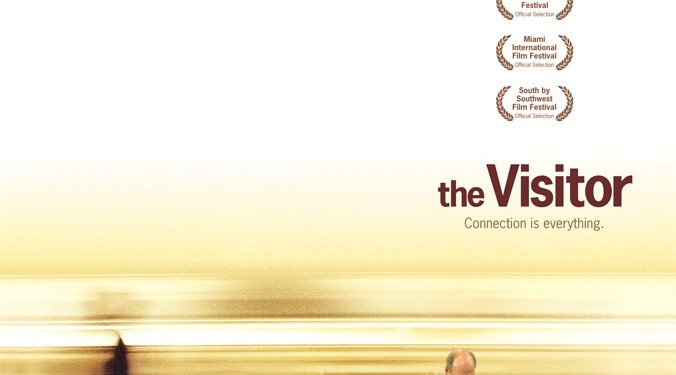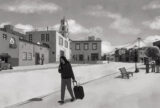The Visitor
10.7.2008 | By Alex Florez |
Rated: PG-13 for some strong language.
Release Date: 2008-04-11
Starring: Thomas McCarthy
Director(s):
Distributor:
Film Genre:
Country:USA
Official Website: http://www.thevisitorfilm.com/
It’s a pleasant thing to encounter occasionally a movie in which people are portrayed as decent (if flawed) individuals. In The Visitor, there are no human villains. No one wears a black hat. The antagonist is The System – the nameless, faceless arm of a bureaucracy that flexes its muscles and crushes whoever happens to be in its grip at the time. In this case, it’s the Immigration Department, but it might be any of thousands of government and private organizations where the “human element” has been eliminated in favor of procedures. However, while the struggle against The System forms an important aspect of The Visitor, this is much more about the growth of one man who discovers that the island of solitude is a cold and lonely place.
We all know Richard Jenkins even if we don’t recognize the name. He’s a character actor who has appeared in supporting roles with increasing regularity since the early ’80s. The Visitor, written and directed by The Station Agent‘s Thomas McCarthy, gives Jenkins a rare lead part and he brings to it a mixture of pathos and wit. The chief pleasure of The Visitor is in watching Jenkins’ character, Walter Vale, grow. Jenkins never overplays the role, opting for a low-key approach that makes the one scene where Walter boils over all the more effective. A lot of heart goes into the performance; when Walter encounters something that gives him a brief flurry of happiness, we smile with him.
Walter lives alone in a suburban Connecticut home. He’s a widower and all the passion left his life with the death of his wife. He gets no joy from his work as a university professor and his attempts to find a hobby that will engage him are fruitless. He is sent to New York to present a paper and that’s where his safe, compartmentalized existence takes an unexpected turn. Entering his rarely used city apartment, Walter finds it to be lived-in. Two squatters, Tarek (Haaz Sleiman) and Zainab (Danai Gurira), have moved in. In the wake of a confrontation that entails much discomfort and embarrassment on both sides, Walter invites them to remain in the apartment for as long as they need to find a new place to live. And, while Zainab keeps Walter at arm’s length, the gregarious Tarek befriends him. But Tarek, who was born in Syria, and Zainab, who comes from Senegal, are in the United States illegally and, when a minor infraction lands Tarek in jail, he is scheduled for deportation.
We know how the Hollywood version of this movie would end. Al Pacino, playing Walter, would show up at the deportation hearing and give a big speech that ends with a gutsy “Hoo ha!” The Visitor, however, seeks to drain some of the fantasy element from the situation. People in real life don’t give Pacino-like speeches and, on those rare occasions when they do, those orations rarely cause any change. That’s because The System doesn’t care about pretty words or flowery speech. Terry Gilliam had it right in Brazil.
Music is an important element. It forms the initial bridge between Walter and Tarek and becomes a critical element of Walter’s re-birth. Tarek plays African drums and he gives lessons to Walter, who has been haltingly trying to play the piano. Some of Walter’s early attempts to practice provide a few chuckles but he develops into a surprisingly adept pupil. We learn that Walter’s late wife was an accomplished pianist and now he has rediscovered the joy of living through another form of music. He gives up the past, as represented by the piano, and embraces the future, as represented by the drums. The symbolism is simplistic but effective.
The Visitor might easily be called The Awakening of Walter Vale. As the movie progresses and Walter becomes more embroiled in Tarek’s cause, the film gives us longer and more frequent glimpses of the man he must have been before his wife’s death. His quasi-romantic relationship with Tarek’s mother (Hiam Abbass), which takes up the bulk of the production’s second half, is a little forced and doesn’t always ring true, but it aids in the protagonist’s revival. The Visitor ends on an ambiguous, bittersweet note, but the last scene offers a portrait that is tinged more with hope than sadness. This is a simple story of human drama that provides an incentive to spend a couple of hours in a movie theater during a spring that has not provided many such reasons.


































